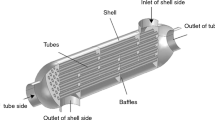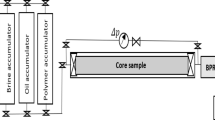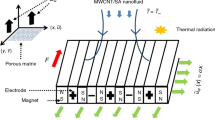Abstract
The viscosity of MWCNT–Al2O3 (40–60)/5W50 hybrid nanofluid (NF) has been investigated. According to the results at different volume fractions (VFs) and temperatures, it possesses a behavior like non-Newtonian fluids. In this paper, we first compare MWCNT–Al2O3 (40–60%)/5W50 hybrid NF with MWCNT–Al2O3 (35–65%)/5W50 hybrid NF with focus on viscosity and cost performance index. Investigations were carried out for two shear rates (SR) of 3999 and 5332 (1/s). The decrease in viscosity at the SR of 3999 and in the VF of 1% at temperatures between 5 and 45 °C was 84%, and the SR of 5332 at 15 °C increased by 24%. Sensitivity was also studied, and at temperatures of 5–45 °C at a VF of 0.05%, this value was about 0.2%. This low viscosity sensitivity is very effective in improving the application of NFs in various engineering systems. A new empirical relation to anticipate the NF viscosity in accordance with the experimental results is also presented. The coefficient of determination (R2) for the mentioned relation is 0.9982, indicating the accuracy of the presented empirical relation to predict the NF viscosity at the tested temperature and concentration ranges.
Graphic abstract














Similar content being viewed by others
Abbreviations
- k nf :
-
Thermal conductivity of nanofluid
- k f :
-
Thermal conductivity of base fluid
- T :
-
Temperature
- \( T_{\text{h}} \) :
-
Hot temperature (K)
- \( T_{\text{c}} \) :
-
Cold temperature (K)
- MOD:
-
Margin of deviation
- SVF:
-
Solid volume fraction
- SSA:
-
Specific surface area
- PPF:
-
Price performance factor
- BET:
-
Brunauer–Emmett–Teller
- TGA:
-
Thermogravimetric analysis
- τ :
-
Shear stress (Pa)
- \( \dot{\gamma } \) :
-
Shear rate (1/s)
- m :
-
Consistency index
- n :
-
Power-law index
- \( k \) :
-
Porosity coefficient
- \( \rho \) :
-
Density (kg m−3)
- \( \mu \) :
-
Dynamic viscosity (kg m−1 s−1)
- \( \theta \) :
-
Dimensionless temperature
- \( \varphi \) :
-
Volume fraction (%)
- f:
-
Base fluid
- nf:
-
Nanofluid
References
X. Wang, X. Xu, S.U. Choi, Thermal conductivity of nanoparticle-fluid mixture. J. Thermophys. Heat Transf. 13(4), 474–480 (1999)
M.H. Esfe, H. Rostamian, S. Esfandeh, M. Afrand, Modeling and prediction of rheological behavior of Al2O3-MWCNT/5W50 hybrid nano-lubricant by artificial neural network using experimental data. Physica A 510, 625–634 (2018)
X.X. Tian, R. Kalbasi, C. Qi, A. Karimipour, H.L. Huang, Efficacy of hybrid nano-powder presence on the thermal conductivity of the engine oil: an experimental study. Powder Technol. 369, 261–269 (2020)
M.H. Esfe, A.T.K. Abad, M. Fouladi, Effect of suspending optimized ratio of nano-additives MWCNT-Al2O3 on viscosity behavior of 5W50. J. Mol. Liq. 285, 572–585 (2019)
H.D. Koca, S. Doganay, A. Turgut, I.H. Tavman, R. Saidur, I.M. Mahbubul, Effect of particle size on the viscosity of nanofluids: a review. Renew. Sustain. Energy Rev. 82, 1664–1674 (2018)
M.V. Bozorg, M.H. Doranehgard, K. Hong, Q. Xiong, CFD study of heat transfer and fluid flow in a parabolic trough solar receiver with internal annular porous structure and synthetic oil–Al2O3 nanofluid. Renew. Energy 145, 2598–2614 (2020)
I. Wole-Osho, E.C. Okonkwo, D. Kavaz, S. Abbasoglu, An experimental investigation into the effect of particle mixture ratio on specific heat capacity and dynamic viscosity of Al2O3-ZnO hybrid nanofluids. Powder Technol. 363, 699–716 (2020)
S.V. Sujith, A.K. Solanki, R.S. Mulik, Experimental evaluation on rheological behavior of Al2O3-pure coconut oil nanofluids. J. Mol. Liq. 286, 110905 (2019)
M.H. Esfe, H. Rostamian, M.R. Sarlak, M. Rejvani, A. Alirezaie, Rheological behavior characteristics of TiO2-MWCNT/10w40 hybrid nano-oil affected by temperature, concentration and shear rate: an experimental study and a neural network simulating. Physica E 94, 231–240 (2017)
G. Colangelo, E. Favale, P. Miglietta, M. Milanese, A. de Risi, Thermal conductivity, viscosity and stability of Al2O3-diathermic oil nanofluids for solar energy systems. Energy 95, 124–136 (2016)
A.A. Nadooshan, M.H. Esfe, M. Afrand, Prediction of rheological behavior of SiO2-MWCNTs/10W40 hybrid nanolubricant by designing neural network. J. Therm. Anal. Calorim. 131(3), 2741–2748 (2018)
M.H. Esfe, M. Bahiraei, M.H. Hajmohammad, M. Afrand, Rheological characteristics of MgO/oil nanolubricants: experimental study and neural network modeling. Int. Commun. Heat Mass Transfer 86, 245–252 (2017)
M.H. Esfe, S. Saedodin, M. Rejvani, J. Shahram, Experimental investigation, model development and sensitivity analysis of rheological behavior of ZnO/10W40 nano-lubricants for automotive applications. Physica E 90, 194–203 (2017)
M.H. Esfe, M.H. Hajmohammad, P. Razi, M.R.H. Ahangar, A.A.A. Arani, The optimization of viscosity and thermal conductivity in hybrid nanofluids prepared with magnetic nanocomposite of nanodiamond cobalt-oxide (ND-Co3O4) using NSGA-II and RSM. Int. Commun. Heat Mass Transfer 79, 128–134 (2016)
M.H. Esfe, A.A.A. Arani, S. Esfandeh, Improving engine oil lubrication in light-duty vehicles by using of dispersing MWCNT and ZnO nanoparticles in 5W50 as viscosity index improvers (VII). Appl. Therm. Eng. 143, 493–506 (2018)
M. Afrand, K.N. Najafabadi, M. Akbari, Effects of temperature and solid volume fraction on viscosity of SiO2-MWCNTs/SAE40 hybrid nanofluid as a coolant and lubricant in heat engines. Appl. Therm. Eng. 102, 45–54 (2016)
M. Asadi, A. Asadi, Dynamic viscosity of MWCNT/ZnO–engine oil hybrid nanofluid: an experimental investigation and new correlation in different temperatures and solid concentrations. Int. Commun. Heat Mass Transf. 76, 41–45 (2016)
E. Dardan, M. Afrand, A.M. Isfahani, Effect of suspending hybrid nano-additives on rheological behavior of engine oil and pumping power. Appl. Therm. Eng. 109, 524–534 (2016)
K. Motahari, M.A. Moghaddam, M. Moradian, Experimental investigation and development of new correlation for influences of temperature and concentration on dynamic viscosity of MWCNT-SiO2 (20–80)/20W50 hybrid nano-lubricant. Chin. J Chem. Eng. 26, 152–158 (2018)
M. Corcione, Empirical correlating equations for predicting the effective thermal conductivity and dynamic viscosity of nanofluids. Energy Convers. Manag. 52(1), 789–793 (2011)
D.H. Fontes, G. Ribatski, E.P. Bandarra Filho, Experimental evaluation of thermal conductivity, viscosity and breakdown voltage AC of nanofluids of carbon nanotubes and diamond in transformer oil. Diam. Relat. Mater. 58, 115–121 (2015)
R. Rajesh, S. Sumathi, Certain performance investigation on hybrid TiO2/Al2O3/MoS2 nanofiller coated 3∅ induction motor: a Taguchi and RSM based approach. Energy Rep. 6, 1638–1647 (2020)
A.S. Alqahtani, W.M. Alenazy, S. Pandiaraj, Optimization on heat-transfer coefficient of plate heat exchanger using MWCNT-TiO2 nanofluid by response surface methodology. Mater. Res. Express 7, 084002 (2020)
M.H. Esfe, S. Esfandeh, A.A.A. Arani, Proposing a modified engine oil to reduce cold engine start damages and increase safety in high temperature operating conditions. Powder Technol. 355, 251–263 (2019)
M.H. Esfe, R. Karimpour, A.A.A. Arani, J. Shahram, Experimental investigation on non-Newtonian behavior of Al2O3-MWCNT/5W50 hybrid nano-lubricant affected by alterations of temperature, concentration and shear rate for engine applications. Int. Commun. Heat Mass Transf. 82, 97–102 (2017)
Author information
Authors and Affiliations
Corresponding author
Rights and permissions
About this article
Cite this article
Hemmat Esfe, M., Alidoust, S. Experimental evaluation of MWCNT–Al2O3 (40–60%)/5W50 hybrid nanofluid and comparison with MWCNT–Al2O3 (35–65%)/5W50 hybrid nanofluid with focus on thermophysical properties and cost performance index. Eur. Phys. J. Plus 135, 817 (2020). https://doi.org/10.1140/epjp/s13360-020-00807-9
Received:
Accepted:
Published:
DOI: https://doi.org/10.1140/epjp/s13360-020-00807-9




